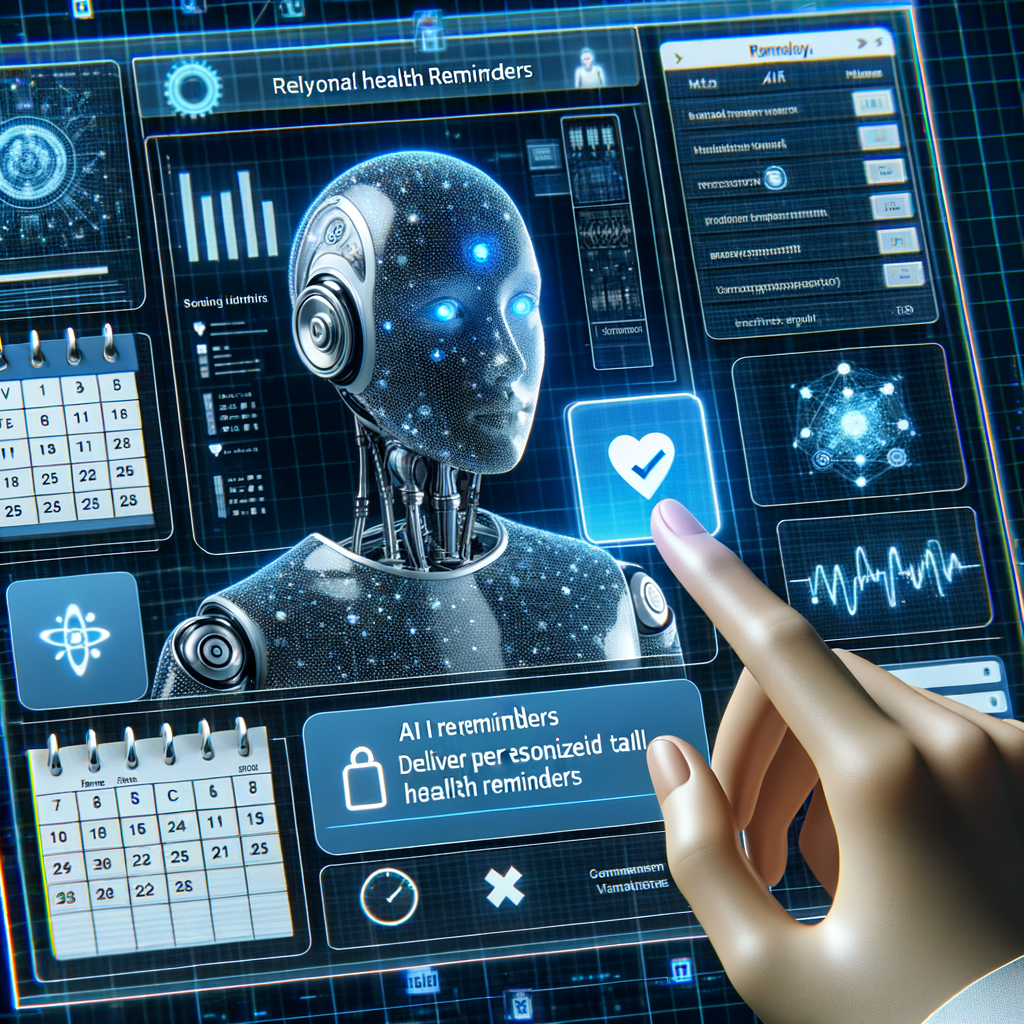Revolutionizing Healthcare with Personalized Health Reminders
Revolutionizing Healthcare with Personalized Health Reminders

Healthcare – Personalized Health Reminders from AI Phone Agents
The Revolution of Healthcare
The healthcare industry is undergoing a transformation, and much of it can be credited to advancements in technology. Amidst this tech-driven revolution, AI phone agents have emerged as game-changers, offering personalized health reminders that cater to individual needs.
Understanding AI in Healthcare
What Are AI Phone Agents?
AI phone agents are essentially virtual assistants powered by artificial intelligence designed to interact with individuals over phone calls. These agents use advanced algorithms to analyze data, understand patterns, and provide personalized reminders.
Benefits of AI in Healthcare
From appointment scheduling to medication reminders, AI has the potential to enhance efficiency and accuracy, reducing the burden on healthcare professionals and improving patient outcomes.
Personalized Health Reminders
The Importance of Personalized Reminders
Personalized health reminders ensure that patients adhere to their treatment plans, attend appointments, and take medications on time, which can significantly improve health outcomes.
How AI Personalizes Health Reminders
AI gathers and analyzes vast amounts of data from various sources like electronic health records, wearable devices, and personal inputs to tailor reminders to an individual’s specific needs and habits.
How AI Phone Agents Work
Data Collection and Analysis
AI phone agents collect data from multiple sources, including medical records, user interactions, and sensor data. This data is then analyzed to understand patterns and predict the most effective times and methods for reminders.
Natural Language Processing (NLP)
Thanks to NLP, AI phone agents can understand and respond to human language naturally, making interactions seamless and intuitive for users.
Enhancing User Engagement
By mimicking human-like conversations, AI phone agents enhance user engagement, making it more likely for individuals to follow through with the reminders.
Real-Time Adaptations
AI phone agents can adapt in real-time based on user responses and changing health conditions, ensuring that reminders remain relevant and effective.
Advantages of Personalized Health Reminders from AI Phone Agents
Improved Adherence
Personalized reminders can significantly improve medication adherence, ensuring that patients stick to their prescribed treatments.
Reduced No-Show Rates
Timely appointment reminders reduce the likelihood of missed appointments, optimizing healthcare resources and improving patient care.
Enhanced Monitoring
AI phone agents can monitor patient conditions and provide timely reminders for activities like exercise, diet, and routine check-ups, promoting better overall health.
Cost-Effective Solution
By automating routine tasks, AI phone agents reduce the workload on healthcare professionals, leading to cost savings for healthcare providers and improved resource allocation.
Potential Challenges and Solutions
Privacy Concerns
One of the primary concerns is the privacy and security of patient data. Ensuring robust data protection measures and complying with regulations like HIPAA is critical.
Technological Barriers
Integrating AI phone agents with existing systems can be challenging. However, advancements in interoperability standards are paving the way for smoother integration.
The Future of AI in Healthcare
Continuous Innovations
The field of AI is continuously evolving, and further innovations are expected to enhance the capabilities of AI phone agents, making them even more effective and versatile.
Wider Adoption
As more healthcare providers recognize the benefits, the adoption of AI phone agents is expected to rise, leading to a more connected and efficient healthcare ecosystem.
Success Stories
Case Study: Improved Medication Adherence
In a recent study, patients who received personalized medication reminders from AI phone agents exhibited a 30% improvement in adherence compared to those who received generic reminders.
Case Study: Reduced Appointment No-Shows
Another case study highlighted a significant reduction in no-show rates, with AI-driven appointment reminders reducing missed appointments by 25% in a large healthcare network.
Getting Started with AI Phone Agents
Choosing the Right Provider
Selecting a reliable AI phone agent provider is crucial. Factors to consider include data security, customization options, and ease of integration with existing systems.
Implementation Steps
Implementing AI phone agents involves several steps, including data integration, customization of reminders, training for healthcare staff, and continuous monitoring and optimization.
Conclusion
AI phone agents are transforming healthcare by providing personalized health reminders that enhance patient adherence, reduce no-show rates, and improve overall health outcomes. While there are challenges to overcome, the benefits far outweigh them, promising a future where healthcare is more connected, efficient, and patient-centric.
FAQs
1. How secure is my data with AI phone agents?
AI phone agents use advanced encryption and comply with health regulations like HIPAA to ensure the security and privacy of your data.
2. Can AI phone agents adapt to changes in my health condition?
Yes, AI phone agents can analyze real-time data and adjust reminders based on any changes in your health condition, ensuring the relevancy of reminders.
3. Are AI phone agents available 24/7?
Typically, AI phone agents are available round the clock, providing reminders and assistance whenever needed.
4. How do I start using an AI phone agent for health reminders?
Contact a reputable provider, discuss your needs, and they will guide you through the setup and integration process.
5. Do AI phone agents need training?
While the AI itself is pre-trained, healthcare staff may need training to effectively manage and customize the system to fit specific needs.

